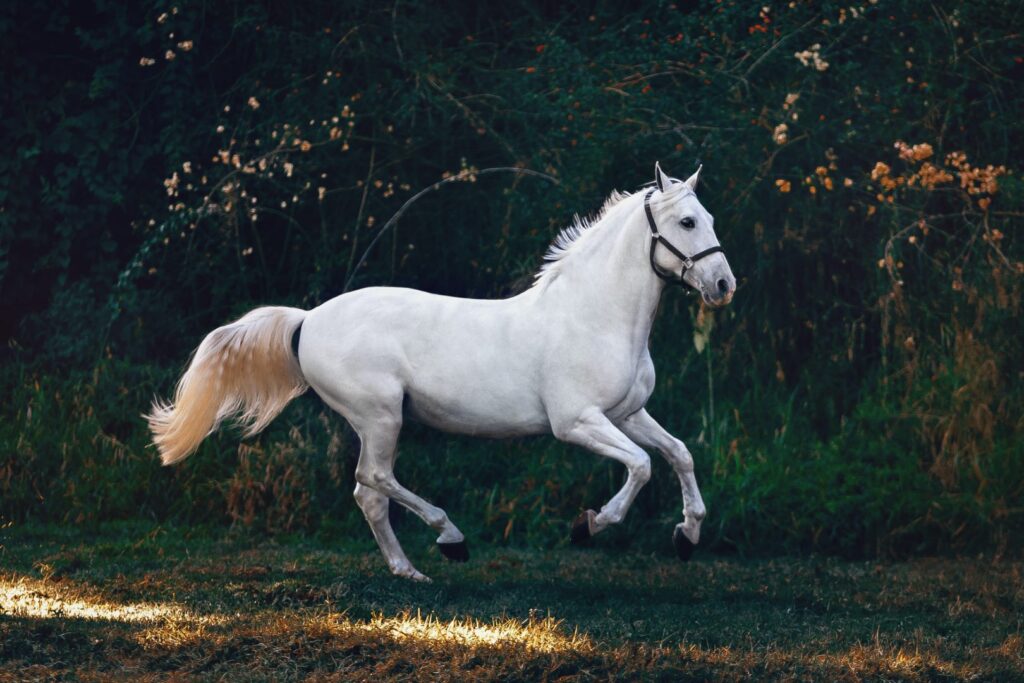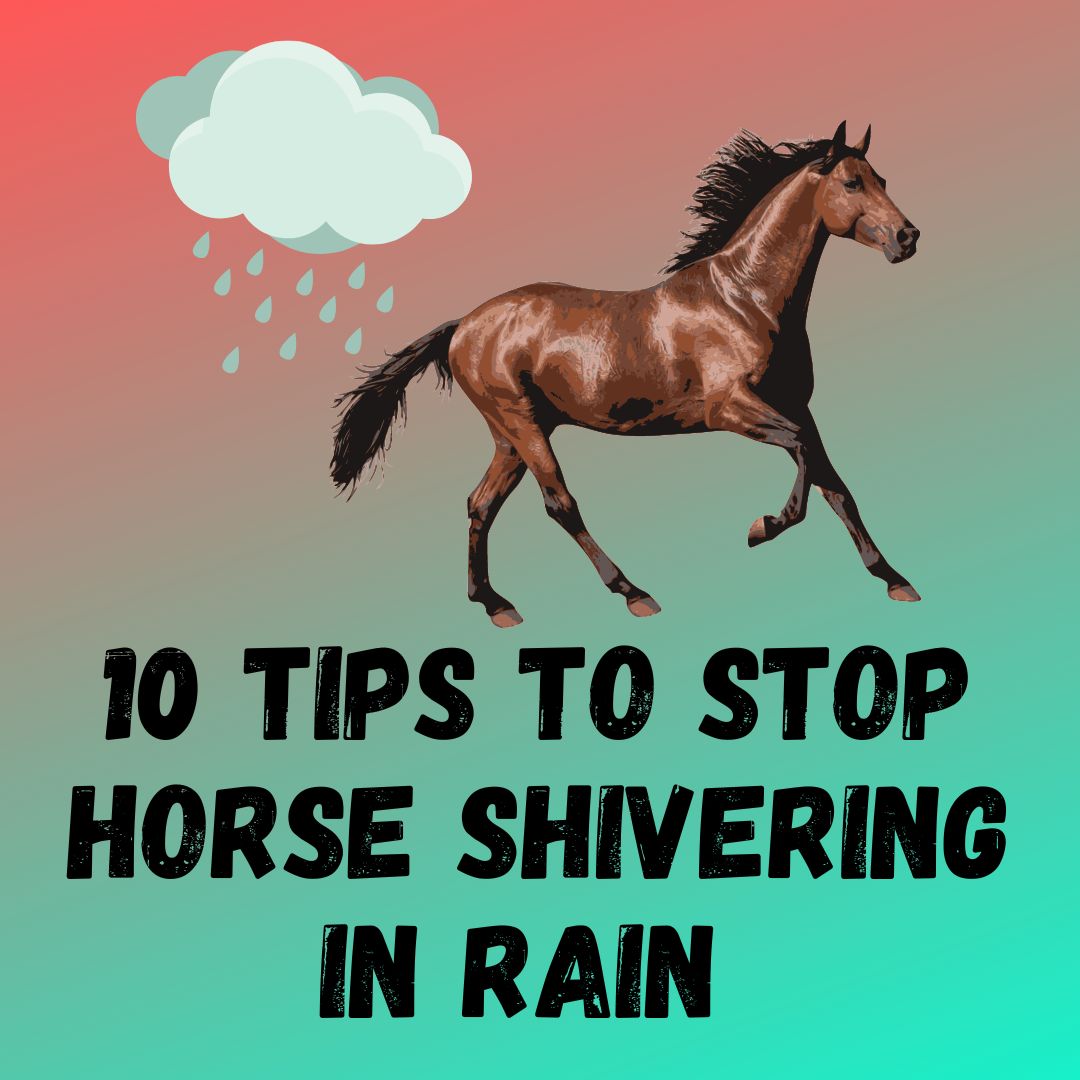Rainy weather can cause horses to shiver and their muscles to tremble. It’s a normal reaction to the cold, but the good news is that this doesn’t have to be an ongoing problem. With the right preventative measures, you can help your horse stay comfortable in wet and windy conditions. In this blog post, we’ll look at 10 tips for preventing shivering and muscle trembling in horses during wet weather conditions. From blankets and boots to nutrition and grooming, these guidelines will keep your horse safe from the elements when it’s raining outside.
Post Contents
- 1) Get a Rain Sheet
- 2) Consider His Overall Health
- 3) Add a Little More Hay to His Diet
- 4) Think About Changing His Turnout Schedule
- 5) Check for Both Internal and External parasites
- 6) Be Sure He’s Getting Enough Electrolytes
- 7) Keep an Eye on His Hooves
- 8) Avoid using lotions or oils on his coat before heading out in the rain.
- 9) See if a Different Type of Blanket Might Help
- 10) Think About Adding Supplements to His Diet
- Do Horses Get Cold In The Rain?
- How To Acclimate Your Horse To The Rain
- How To Tell if Your Horse is Cold ?
- Horse is Wearing a Blanket But Still Shivering
- How to Prevent Rainy Day Blues
- How to Keep Your Horse Happy Inside During the Rain
- Is It Normal For Horses To Shiver In The Cold?
- Why Does My Horse Shiver When It Rains?
- Summary
1) Get a Rain Sheet
Assuming your horse is healthy and has a good coat, there are a couple things you can do to help stop the shivering and muscle trembling.
First, get a rain sheet! This will help keep your horse’s body temperature regulated and dry. If you don’t have a rain sheet, you can improvise with an old blanket or something similar. Just make sure it’s big enough to cover your horse’s entire body and keep him dry.
Second, make sure your horse has access to shelter from the rain. If he’s stuck out in the rain, he’s going to get cold and wet no matter what you do. So give him a break and let him into the barn or paddock until the storm passes.
Finally, if your horse is still shivering despite these measures, it’s time to call the vet. There could be an underlying health condition causing the problem, and it’s best to get it checked out just in case.
2) Consider His Overall Health
When it comes to your horse’s health, there are a few things you should always consider. His overall health is important, of course, but you should also pay attention to his diet, exercise routine, and any medical conditions he may have.
If your horse is healthy, he shouldn’t have any problems with shivering or muscle trembling in the rain. However, if he’s unhealthy or if he has a medical condition that makes him more susceptible to these issues, you’ll need to take extra care of him when the weather gets bad.
Make sure that your horse is getting enough exercise and that his diet is balanced. If he has any medical conditions, talk to your vet about how to best care for him in the rain. By taking these precautions, you can help ensure that your horse stays healthy and comfortable all season long.
3) Add a Little More Hay to His Diet
As the weather starts to turn and we begin to see more rain, our horses may start to shiver and their muscles may start to tremble. This is perfectly normal and is the horse’s way of trying to keep warm. However, if your horse is shivering and trembling excessively, there are a few things you can do to help stop the shaking.
One of the best things you can do is add a little more hay to his diet. Hay is a great source of insulation and will help your horse stay warm even when the temperature drops. If your horse is already on a hay-based diet, you may need to increase the amount of hay he is eating. You should also make sure that he has access to plenty of fresh water so he can stay hydrated.
If your horse is still shivering and trembling after taking these steps, it’s important to talk to your vet. Excessive shivering can be a sign of illness or injury, so it’s always best to err on the side of caution and get your vet’s opinion.
4) Think About Changing His Turnout Schedule
When it comes to your horse’s turnout schedule, there are a few things to consider if you want to stop him from shivering and muscle trembling in the rain.
First, you’ll need to decide how much time he needs out of his stall each day. If he’s used to being turned out for several hours at a time, then you may need to cut back on his turnout time or turn him out more frequently throughout the day.
Secondly, you’ll need to think about where he’s turned out. If he’s in a pasture that’s constantly wet and muddy, then he may be more likely to shiver and tremble. Try turning him out in a drier area, such as an arena or paddock, until the weather improves.
Finally, you’ll need to make sure that he has access to shelter from the elements. If there’s nowhere for him to go to escape the rain and wind, then he’ll likely start shivering and trembling. Provide him with arun-in shed or other type of shelter so that he can get out of the weather when he needs to.
5) Check for Both Internal and External parasites
Horses are susceptible to both internal and external parasites. Internal parasites, such as stomach worms, can cause a horse to lose weight and suffer from diarrhea. External parasites, such as bot flies, can cause a horse to itch and rub its coat.
To help prevent horses from suffering from parasites, it is important to regularly check both their feces and their coat for any signs of infestation. If you find any evidence of parasites, be sure to treat the horse immediately with the appropriate medication.
6) Be Sure He’s Getting Enough Electrolytes
If your horse is shivering or trembling in the rain, it’s important to make sure he’s getting enough electrolytes. Electrolytes are minerals that help regulate body functions, and they’re essential for horses in intense exercise or hot weather. When it’s cold and wet, horses can lose electrolytes through sweating and urination. This can lead to muscle weakness and cramping.
Make sure your horse has access to a salt block, and offer him electrolyte supplements before and after exercise or during periods of heavy sweating. You can also add electrolytes to his feed. Check with your veterinarian for guidance on how much to give based on your horse’s weight and level of activity.
7) Keep an Eye on His Hooves
It’s no secret that horses are susceptible to cold weather and rain. But did you know that there are some things you can do to help stop your horse from shivering and muscle trembling? Here are a few tips:
1. Keep an eye on his hooves. If they get too wet, they can start to crack and bleed. This can lead to serious health problems, so make sure you dry them off well after he’s been in the rain.
2. Give him plenty of hay. Horses need extra calories to stay warm in cold weather, so hay is a great way to achieve this. Make sure he has access to plenty of fresh, dry hay during the winter months.
8) Avoid using lotions or oils on his coat before heading out in the rain.
These can actually make his coat more susceptible to the elements and cause him to be even colder.
Instead, opt for a waterproof jacket or blanket that will help keep him warm and dry.
9) See if a Different Type of Blanket Might Help
If your horse is shivering or trembling in the rain, there are a few things you can do to help them. One option is to try a different type of blanket. There are many different types of horse blankets on the market, so you may need to experiment to find one that works best for your horse. Some blankets are designed to be waterproof, while others are designed to be more breathable. You may also want to consider a blanket with a higher neckline to help keep your horse’s head and neck dry.
Another option is to use a liner under your horse’s regular blanket. This can help create an extra layer of warmth and protection from the elements. You can also use a sheet over your horse’s regular blanket if you don’t have a liner. If you go this route, make sure the sheet is secure and will not blow off in the wind.
10) Think About Adding Supplements to His Diet
If your horse is shivering and muscle trembling in the rain, there are a few things you can do to help. One is to think about adding supplements to his diet.
There are many different supplements on the market that claim to help with rain rot, horses sweating, and other issues. Do your research and talk to your veterinarian before adding anything to your horse’s diet.

Do Horses Get Cold In The Rain?
Yes, horses can get cold in the rain, especially if they are not used to being outdoors in inclement weather. It is important to acclimate your horse to the weather conditions before taking them out in the rain. Here are some tips to stop horses shivering and muscle trembling in the rain:
How To Acclimate Your Horse To The Rain
If your horse is not used to being outdoors in the rain, it is important to slowly acclimate them to the weather conditions. Start by taking them out for short periods of time, gradually increasing the duration each day.
Be sure to keep an eye on their body language and watch for signs of discomfort or distress. If at any point your horse seems uncomfortable, bring them back inside and try again another day.
How To Tell if Your Horse is Cold ?
When horses are cold, they will often shiver and their muscles may tremble. This is a natural response that helps the horse generate heat and keep warm. However, if your horse is shivering and trembling excessively, this may be a sign that they are too cold and need to be brought inside or given additional blankets.
Here are some signs to look for that may indicate your horse is too cold:
-Excessive shivering or muscle trembling
-Unusual lethargy or weakness
-Pale gums or lips
-Dark urine
If you notice any of these signs, it’s important to take action to warm up your horse. Bring them inside if possible, or cover them with a blanket or tarp. You can also provide them with a warm drink, such as molasses water or herbal tea. And make sure to monitor them closely until they are no longer showing signs of being cold.

Horse is Wearing a Blanket But Still Shivering
Your horse is shaking and shivering, even though he’s wearing a blanket. Why is he still cold, and what can you do to help him warm up?
Here are some tips to stop your horse from shivering and trembling in the rain:
1. Make sure your horse is properly blanketed. A good rule of thumb is to use a heavier blanket in cooler weather and a lighter one when it’s warmer out. If your horse is still shivering, try layering blankets or using a different type of material.
2. Check that your horse’s coat is clean and dry. A wet or dirty coat will make your horse more likely to feel cold. Groom your horse before turnout and make sure to towel him off after he comes in from the rain.
3. Provide shelter from the elements. If possible, turn your horse out in a dry paddock or field where he can get out of the wind and rain. If you don’t have access to an indoor arena or stall, try setting up a makeshift shelter with tarps or blankets.
4. Increase his calorie intake. Cold weather can cause horses to burn more calories just to stay warm. Make sure your horse has access to plenty of hay and grain, and consider adding a calorie-dense supplement to his diet if he’s not getting enough calories from his regular food sources
How to Prevent Rainy Day Blues
If your horse shivers and trembles in the rain, there are a few things you can do to help them feel more comfortable.
First, make sure they have a shelter to get out of the weather. If they don’t have access to a barn or stall, consider putting up a portable shelter or buying a rainsheet.
Second, layer their clothing so they can adjust to changes in temperature. A good base layer is key, followed by a waterproof outer layer.
Finally, give them plenty of hay and fresh water so they can stay warm and hydrated.
How to Keep Your Horse Happy Inside During the Rain
When it rains, many horses shiver and their muscles tremble. This is often due to the cold and wet weather, but it can also be a sign of anxiety or fear. If your horse is shivering and trembling, there are a few things you can do to help them feel more comfortable and stop the shaking.
First, make sure your horse has access to shelter from the rain. If they are outside, provide them with a large umbrella or tarp to stand under. If they are inside, make sure they have a dry stall with plenty of hay or straw to keep them warm.
Second, consider using a blanket or wraps on your horse to help them stay warm. Make sure the blanket is waterproof and fits well so that it doesn’t rub and cause discomfort.
Third, give your horse extra food and water during rainy weather. Horses use more energy to stay warm in cold weather, so they need more calories. Provide them with high-quality hay or grass hay, as well as grain or other concentrated feeds if needed. Be sure to also provide plenty of fresh, clean water at all times.
Is It Normal For Horses To Shiver In The Cold?
When it rains, many horse owners worry about their horse’s muscles trembling and shivering. While it is normal for horses to shiver in the cold, there are a few things you can do to help stop the muscle tremors and keep your horse comfortable.
One way to stop horses shivering is to provide them with a blanket or coat. If your horse is used to wearing a blanket or coat, be sure to put it on them before the rain starts so that their body temperature doesn’t have time to drop. If your horse isn’t used to wearing a blanket, slowly introduce them to the idea by putting it on for short periods of time while they’re dry. Once they’re accustomed to the blanket, they’ll be more likely to tolerate wearing it in the rain.
Another way to stop Horse shivering is by feeding them hay before turnout. Hay helps provide horses with extra energy and warmth, both of which can help prevent muscle tremors. If you don’t have access to hay, consider giving your horse an extra grain ration or adding some molasses to their feed.
If you notice that your horse is still shivering despite these measures, consult with your veterinarian. There could be an underlying medical condition causing the tremors, such as hypothermia or stress. With proper treatment, you can help your horse feel comfortable and warm all winter long.
Why Does My Horse Shiver When It Rains?
Horses shiver when it rains because they are trying to keep warm. Their muscles contract and relax rapidly, which causes the shaking. This is a natural reflex that helps horses stay warm in cold weather. If your horse is shivering, there are a few things you can do to help stop the muscle trembling:
– Give your horse a blanket or coat to wear. This will help them retain body heat and stay warmer.
– Make sure they have access to shelter from the rain. This will protect them from getting wet and cold.
– Feed them extra hay or grain to give them more calories to burn for energy. This will help keep their body temperature up.
– Give them a vitamin B Complex supplement, which can help calm nerves and reduce muscle tremors.
Summary
In the cold weather, be sure to provide your horse with a warm stall, plenty of hay or straw, and a dry area to stand under. If they are inside, make sure they have a blanket or wraps to keep them warm.
If it’s wet outside, give your horse extra food and water to help them stay hydrated and warm. If your horse is still shivering despite these measures, consult with your veterinarian. There could be an underlying medical condition causing the tremors.

94% of pet owners say their animal pal makes them smile more than once a day. In 2007, I realized that I was made for saving Animals. My father is a Vet, and I think every pet deserves one. I started this blog, “InPetCare”, in 2019 with my father to enlighten a wider audience.
